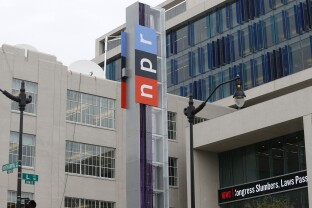A federal judge in D.C. on Tuesday blocked the White House from immediately exerting control over NPR and PBS just a day after President Donald Trump claimed to have the authority to fire most of the directors overseeing their parent company, the Corporation for Public Broadcasting.
U.S. District Judge Randolph Moss forbade the Trump administration from replacing three board members without providing at least two days’ notice to give the court time to potentially step in.
Trump, who has spent weeks asserting broad authority across the federal government, is attempting to take over the nonprofit that oversees NPR and the PBS. The fight could have immediate consequences for the operations of the country’s most prominent source of commercial-free news, educational kids TV programming and vetted popular learning apps used by small children.
On Monday, CPB board members Diane Kaplan, Laura G. Ross and Thomas E. Rothman received an email from the White House that claimed Trump was exercising what it said was his right to fire them.
“On behalf of President Donald J. Trump, I am writing to inform you that your position on the Corporation for Public Broadcasting is terminated effective immediately. Thank you for your service,” said the email sent by Trent Morse, deputy director of presidential personnel.
That move came a month after Trump and Republicans simultaneous attack n NPR and PBS. In late March, Rep. Marjorie Taylor Greene held a DOGE subcommittee hearing called “Anti-American Airwaves” and used it to demand that the government break apart the CPB.
Days later, the president wrote on social media that NPR and PBS should be “DEFUNDED by Congress, IMMEDIATELY.”
“Republicans, don’t miss this opportunity to rid our Country of this giant SCAM, both being arms of the Radical Left Democrat Party. JUST SAY NO AND, MAKE AMERICA GREAT AGAIN!!!” his account posted on Truth Social.
But instead of waiting for Congress to take up the matter, the president has now asserted he has the power to fire three members of the CPB’s five-person board. Those three members and the corporation, which is based in D.C., immediately sued Trump and White House officials in federal court.
The nonprofit is not an executive agency, but rather was created by Congress through the passage of the Public Broadcasting Act of 1967. Although the CPB’s board of directors is appointed by the president and confirmed by the Senate, those three board members and the corporation claim that no president has the power to summarily dismiss them from their leadership positions.
In court on Tuesday, Moss repeatedly questioned whether there was a time-sensitive reason for him to issue an immediate order fully halting Trump’s attempted exertion of executive power, but he ultimately decided to let the case play out in legal arguments over the next few weeks.
Lawyers for the nonprofit told Moss that D.C. law governing local nonprofits wouldn’t allow the CPB, without a quorum of three people on the five-person board, to authorize the spending of grants valued at more than 1 million dollars, which at the moment might only put at risk the spending of Federal Emergency Management Agency funds that the Trump administration initially held back in February and that could be used to revamp the emergency alert system.
However, Jason McElroy, an attorney whose firm was hired by CPB, warned that the Trump administration is now hanging a “sword of Damocles” over CPB. He pointed to the White House’s recent takeover of the U.S. Institute of Peace, which began with DOGE staff forcing their way into the agency’s headquarters.
McElroy said that takeover “provides an example for the game plan here.” He warned that if federal courts don’t intervene now, these board members might end up being reinstated in three months only to find “there is no corporation for them to come back to.”
Two lawyers from the Department of Justice told the judge they were unfamiliar with the White House’s ultimate aims but backed the president’s attempted use of power.
“Our position is that the president has the authority to remove these directors at will,” said Jeremy Newman, a career DOJ lawyer who works at its civil division.
Moss set a schedule that would allow him to hear more from both sides through the first half of May, at which point he could consider the nonprofit’s demands: that he block any White House interference and declare that the firing email “has no legal effect.”
Left unsaid in court is why the board members have effectively complied in advance by not continuing to assert they still have their jobs. McElroy declined to comment on that after the hearing.
—
Jose Pagliery is a reporter at NOTUS.
Sign in
Log into your free account with your email. Don’t have one?
Check your email for a one-time code.
We sent a 4-digit code to . Enter the pin to confirm your account.
New code will be available in 1:00
Let’s try this again.
We encountered an error with the passcode sent to . Please reenter your email.


